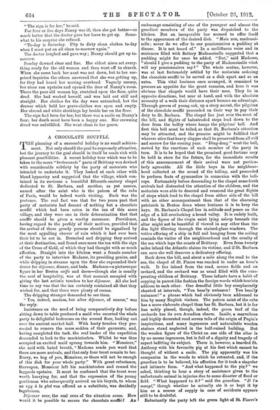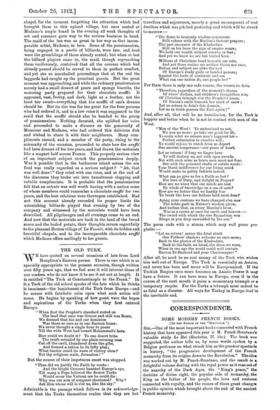A CHOCOLATE SOUFFLE.
THE planning of a successful holiday is no small achieve- ment. Not only should the goal be supremely attractive, but the journey to the goal should in itself be made rich with pleasant possibilities. A recent holiday tour which was to be taken to the more "bretonnants " parts of Brittany was devised with considerable subtlety by the party of motorists who intended to undertake it. They looked at each other with bland hypocrisy and suggested that the village, which con- tained in its environs a beautiful fifteenth-century chapel dedicated to St. Barbara, and another, as yet unseen, named after the saint who is the patron of the cabs of Paris, would be indeed worth visiting. Such was the pretence. The real fact was that for two years past that party of motorists had dreamt of nothing but a chocolate soufflé which had been eaten in the inn of this same village, and they were one in their determination that that soufflé should be given a worthy successor. Providence, having regard to the perfidy of their motives, provided that the arrival of these greedy persons should be signalized by the most appalling shower of rain which it had ever been their lot to be out in. Drenched and dripping they arrived at their destination, and found once more the inn with the sign of the Cross of Gold, of which they had thought with so much affection. Straight into the kitchen went a female member of the party to interview Madame, its presiding genius, and while dripping in streams upon the floor she expounded their desire for cle jeuner, dinner, and beds. Madame—a picturesque figure in her Breton caiffe and dress—though she is usually the soul of hospitality, was at that moment occupied with giving the last artistic touches to her clejeuner. All she had time to say was that the inn certainly contained all that they wished for, and that there were plenty of rooms.
The dripping stranger demanded to see them.
" Yes, indeed, madam, but after cleYeuner, of course," was the reply.
Insistence on the need of being comparatively dry before sitting down to table produced a maid who escorted the whole party to delightful bedrooms on the second floor, looking out over the ancient market hall. With hasty touches they pro- ceeded to remove the more sodden of their garments, and, having completed the task, the real leader of the expedition descended to look to the mackintoshes. Whilst he was thus occupied an excited maid sprang towards him. "Monsieur," she said with bated breath, " Madame sends you word that there are more arrivals, and that only four trout remain to her. Hurry, we beg of you, Monsieur, or there will not be enough of this dish for your whole party." With great reluctance, thereupon, Monsieur left his mackintoshes and roused the laggards upstairs. It must be confessed that the trout were worth hurrying for, and that the expression of the young gentleman who subsequently arrived on his bicycle, to whom an egg a la plat was offered as a substitute, was decidedly lugubrious.
Dejeuner over, the real crux of the situation arose. How would it be possible to secure the chocolate souffle? An embassage consisting of one of the youngest and almost the greediest members of the party was dispatched to the kitchen. But an insuperable bar seemed to offer itself to the appearance of the desired dish. " Mais non, mademoi- selle ; never do we offer to our pensionnaires a pudding at dinner. It is not heard of." In a mellifluous voice and in sentences filled with flattery Mademoiselle suggested that a pudding might for once be added. "But," said Madame, "should I give a pudding to the party of Mademoiselle what will my pensionnaires say?" The whole matter, however, was at last fortunately settled by the motorists ordering the chocolate soufflé to be served as a dish apart and as an extra. This vital business once arranged, it remained to procure an appetite for the great occasion, and here it was obvious that chapels would have their uses. They lie in opposite directions, but near at hand, and with the absolute necessity of a walk their distance apart became an advantage. Through groves of young oak, up a steep ascent, the pilgrims of the chocolate soufflé proceeded on their way to pay their duty to St. Barbara. The chapel lies just over the crest of the hill, and flights of balustraded steps lead down to the door from the belfry where hangs the pilgrims' bell. And first this bell must be tolled, so that St. Barbara's attention may be attracted, and the promise might be fulfilled that whoever stirs that heavy clapper shall be preserved from all evil and sorrow for the coming year. "Ding-dong " went the bell, moved by the exertions of each member of the party in turn. It is to be hoped that the promised good fortune may be held in store for the future, for the immediate results of this announcement of their arrival were not particu- larly agreeable. All the little boys in the neighbour- hood collected at the sound of the tolling, and proceeded to perform feats of gymnastics in connexion with the bell- rope. Fortunately before descending to the chapel some fresh arrivals had distracted the attention of the children, and the motorists were able to descend and reascend the great flights of steps which lead to the chapel from either side of the hill with no other accompaniment than that of the charming patriarch in Breton dress whose business it is to keep the keys. St. Barbara's Chapel lies in solitude and peace on the edge of a hill overlooking a broad valley. It is rudely built, and the figure of the virgin saint lying asleep beneath the altar might not be beautiful if viewed in any other than the dim light filtering through the stained-glass windows. The votive offering of a ship in full sail hanging from the ceiling reminds the visitor of the neighbourhood and the cruelty of the sea which laps the coasts of Brittany. Even from twenty miles inland the Atlantic claims its victims, and if St. Barbara can save she well deserves a dedicatory offering.
Back down the hill, and about a mile along the road to the sea, the chapel of St. Fiacre was reached in under an hour's walk. It lies inland from the road, across fields and an orchard, and the orchard was as usual filled with the exas- perating children of Brittany. These infants have a habit of copying in parrot-like fashion the foreign words which tourists address to each other. One dreadful little boy complacently chanted at intervals, " You beasly nuisance ! You beas'ly nuisance!" a phrase which had obviously been addressed to him by many English visitors. The patron saint of the cabs has a more elaborate chapel than has St. Barbara, but it is far less nobly placed, though, indeed, the green turf of the orchards has its own Arcadian charm. Inside, a marvellous and highly decorated rood screen tells of the origin of Pugin's inspirations, and many ingenuous and naturalistic wooden statues stand neglected in the half-rained building. But the wooden figure of the Christ on one side of the altar is by no means ingenuous, but is full of a dignity and tragedy of aspect befitting its subject. There is, however, a bearded St. Anthony with his favourite pig at his feet which cannot be thought of without a smile. The pig apparently was his companion in the woods to which he retreated, and, if the guardian is to be believed, his affection for it took a singular and intimate form. "And what happened to the pig " we asked, thinking to hear a story of assistance given to the unfortunate animal in injuries due to some disaster of flood or field. "What happened to it?" said the guardian. "Il l'a mangi," though whether he actually ate it or kept it by him as a source of supply in case of accidents appears still to be doubtful.
Reluctantly the party left the green light of St.- Fiaore's chapel, for the moment forgetting the attraction which had brought them to this upland village, but once seated at Madame's ample board in the evening all weak thoughts of art and romance gave way to the serious business in band. The maid of the inn was as great in her way as that incom- parable artist, Madame, in hers. Some of the pensionnaires, being engaged in a pttrtie of billiards, were late, and loud were the grumblings of those already seated ; but when at last the billiard players came in, the maid, though reproaching them vociferously, contrived that all the courses which had already passed should be served to them in perfect comfort, and yet she so marshalled proceedings that at the end the laggards had caught up the punctual guests. But the great moment was approaching, and while the ordinary pensionnaires merely had a small dessert of pears and sponge biscuits, the motoring party prepared for their chocolate souffle. It appeared, vast, frothy, and dark, light as a feather, not the least too sweet—everything that the soufflé of one's dreams should be. But its size was far too great for the four persons who had ordered it, and in a low voice it was suggested to the maid that the souffle should also be handed to the group of pensionnaires. Nothing daunted, she uplifted her voice and proceeded to make a discours on the generosity of Monsieur and Madame, who had ordered this delicious dish and wished to share it with their neighbours. Many com- pliments ensued, and a member of the party, rising to the solemnity of the occasion, proceeded to state how the sou,e had been dreamt of for two years, and had drawn the motorists like a magnet half across France. This properly serious view of an important subject struck the pensionnaires deeply. Was it possible that in the barbarous island across the sea food was really regarded as a serious subject ? " Ah, that was well done?" they cried with one voice, and at the end of the discourse they broke out into tumultuous clapping and voluble compliments. It ie probable that the pensionnaires felt that an entente was well worth having with a nation some of whose members could remember a chocolate soup for two years, and the best relations were thereupon established. Had not this account already exceeded its proper limits the astonishing billiards played that evening by two of the company and witnessed by the motorists would have been described. All pilgrimages and all evenings come to an end. And now that the motorists are back in the land of the bread sauce and the boiled potato, their thoughts return regretfully to the pleasant Breton village of Le Faouot, with its hidden and beautiful chapels, and to the incomparable chocolate soufflé which Madame offers smilingly to her guests.



















































 Previous page
Previous page